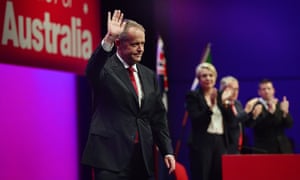Extract from The Guardian
Labor leader promises to enshrine superannuation in national employment standards
Bill Shorten
has used his party’s national conference as a platform to launch
Labor’s pitch for the next federal election, unveiling reforms in his
opening address giving workers power to pursue their unpaid
superannuation.
The Labor leader told delegates, gathered for the three-day event in Adelaide, that superannuation would be added to the national employment standards, a move that would give it the “same protections as any other workplace right”.
The new commitment on superannuation joined a $6.6bn pledge on affordable housing subsidies and a promise to create new environmental regulations as well as a standalone environmental protection agency, endorsing a long campaign by the grassroots lobby group, the Labor Environment Action Network.
While the environmental campaign achieved a breakthrough, a concerted
lobbying effort behind the scenes spearheaded by left-faction delegates
and welfare groups has failed to persuade the Labor leadership to sign
up to an increase in the Newstart payment.The Labor leader told delegates, gathered for the three-day event in Adelaide, that superannuation would be added to the national employment standards, a move that would give it the “same protections as any other workplace right”.
The new commitment on superannuation joined a $6.6bn pledge on affordable housing subsidies and a promise to create new environmental regulations as well as a standalone environmental protection agency, endorsing a long campaign by the grassroots lobby group, the Labor Environment Action Network.
Guardian Australia understands that despite Shorten making much of Labor restoring the fair go, the conference will instead commit to reviewing Newstart within 18 months if Labor wins the coming election. Senior figures were reluctant to sign up to a concrete commitment to increase Newstart because of the fiscal impact.
“People cannot wait for an 18-month review for recommendations and wait again before it is implemented in a budgetary sense,” she said.
“You can’t be serious about inequality without urgently providing income relief for people on the lowest income.”
Apart from policy, behind the scenes, there has also been argy bargy about the election of members of the national executive. That vote was due to happen on Sunday, but has been delayed now until Tuesday.
The delay is partly attributable to arguments within the right faction about who would form the ticket, but it is also tactical. Some sources say the right is intent on pushing the ballot to the floor of the conference, which is a rare event.
The objective of pushing the vote to the floor is to secure an extra spot for the right faction on the party executive, so the right would have 11 spots to the left’s nine, rather than having a 10-10 split between the right and the left factions.
With the next federal election in plain sight, there is a palpable reluctance in Adelaide to force contested policy issues onto the floor, creating public conflict and perceptions of division, but Shorten nonetheless used his opening speech to make a public plea for unity.
Shrugging off a brief protest that marred the opening few minutes of his speech, Shorten told delegates on Sunday “the eyes of the nation” were on Labor for the duration of the conference, and “we have an obligation to millions of our supporters and millions of Australians, who want and need a Labor government, that we measure up”.
With Labor consistently ahead of the Coalition in the opinion polls since the last federal election, fueling growing expectations of an election victory in 2019, Shorten warned colleagues against complacency, noting federal Labor had “only won government from opposition three times since the second world war”.
Shorten said Labor’s task was to “to earn the trust of the Australian people” by working to rebuild the fair go as a bedrock principle.
“If we win this election, our number one challenge and my greatest ambition is to restore trust in our system,” the Labor leader said. “To prove to the Australian people that politics and government can still serve the interests of everyday Australians, still make a difference in the daily lives of our fellow Australians – to show there is still life and hope in the fair go”.
The shadow treasurer Chris Bowen told reporters the superannuation change outlined on Sunday would allow employees or unions to pursue unpaid superannuation through the courts rather than relying on the Australian Taxation Office to police employers who failed to pay.
“Employers who aren’t paying superannuation are ripping off their workers and they are also getting an unfair advantage over those employers doing the right thing,” Bowen said.
Labor’s financial services spokeswoman, Claire O’Neil, said employees lost up to $6bn a year due to unpaid superannuation, describing it as a “scourge on Australian workers”.
“Individuals have not had the ability to make a claim to get their own paid super back and that is wrong, so today, Labor has announced we will be putting superannuation in national employment standards and increasing penalties to dodgy bosses who intentionally underpay workers superannuation.”

No comments:
Post a Comment